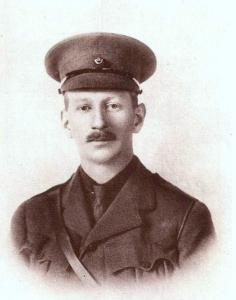
|

|
| Captain Richard Selby DURNFORD | |
|
D Company, 9th (Service) Battalion King’s Royal Rifle Corps Date of birth: 10th May 1885 Date of death: 31st July 1915 Killed in action aged 30 Commemorated on the Menin Gate Panels 51 and 53 |

|
| Richard "Dick" Selby Durnford was born at 18 Sumner Place, Kensington on the 10th of May 1885 the eldest son of Richard M. Durnford CB, a barrister-at-law, and Beatrice Mary (nee Selby) Durnford of Hartley Wespall House, Basingstoke in Hampshire. He was educated at Eton College where he was in Mr. H. Brinton’s House, from January 1899 to July 1904. He was Captain of the Oppidans from 1903 to 1904 and was a member of the 2nd Buckinghamshire (Eton College) Rifle Volunteers from 1902 to 1904. He was also Editor of the Eton College Chronicle in 1903 and 1904. He won a scholarship to King’s College Cambridge where he was an enthusiastic member of the Drama Society. He was placed in the First Class of the Classical Tripos Part 1 Division 3 in 1907 and in the second class of the History Tripos Part II in 1908. While he was at Cambridge he became a Freemason and was admitted as a member of the Isaac Newton University Lodge on the 30th of October 1906. On leaving university he was an assistant master at Lancing College for one year in 1909, after which he left to become an assistant master at Eton College later the same year. While he was back at Eton he applied for a commission in the Officer Training Corps on the 24th of March 1910 and was commissioned as a 2nd Lieutenant in the Corps on the 16th of April 1910. From the 9th to the 21st of January 1911 he underwent instruction with the 1st Battalion Coldstream Guards at Victoria Barracks, Windsor Castle. He was promoted to Captain on the 22nd of May 1912. Following the outbreak of war in August 1914 he was posted by the Director of Military Training to be an instructor at a training camp at Royston in Hertfordshire. He applied for a commission in the army on the 25th of September 1914 in an application which was supported by Mr. E. Lyttleton, Headmaster of Eton College. He underwent a medical examination at Cambridge on the 22nf of September 1914 where it was recorded that he was five feet nine and a half inches tall and that he weighed 160lbs. He was commissioned as a temporary Captain in the King's Royal Rifle Corps on the 1st of October 1914. He was posted to Blenheim Barracks and then to Petworth. He embarked for France with his battalion from Folkestone on board the SS "Victoria" on the 20th of May 1915 and landed at Boulogne at 2am the following morning. At 3.20am on the morning of the 30th of July 1915 the Germans attacked the British lines at Hooge in the Ypres Salient using a new weapon, that of "liquid fire". At 11am that day the 9th Battalion King's Royal Rifle Corps received orders to assemble in trenches just to the south of the Menin Road for an attack which had been planned to recover those trenches which had been lost during the morning's fighting. They gathered in the assembly trench at noon. A covering barrage on the German positions had been ordered for 2pm which lifted at 2.45pm when the King's men went forward, led by their bombers under Lieutenant H.S. Richmond. They were followed by B Company (Captain Tanqueray) and D Company (Captain Durnford) who rushed across the 200 yards of no man's land to the German positions which they carried at the point of the bayonet. Once in the trench a bombing battle took place and many casualties were suffered from enemy rifle and machine gun fire. The arrival of A Company who had been in reserve enabled the captured positions to be consolidated. At 2.15am on morning of the 31st the Germans fired a short but intense artillery barrage on the captured trenches followed by an infantry attack in an attempt to recover them. The enemy attack was driven off but while they were consolidating the captured position Richard Durnford, whose Company had been in support during the attack, came forward to offer assistance. While in the trench he was struck and killed by a stray bullet. The battalion suffered casualties over the two days of 17 officers and 322 other ranks killed, wounded and missing. His father received the following telegram dated the 3rd of August 1915: - "Deeply regret to inform you that Capt. R.S. Durnford 9th KRRC was killed in action 31st July. Lord Kitchener expresses his sympathy." His brother, Captain Robert Chichester Durnford DSO 1/4th Battalion Hampshire Regiment, was killed in action in Mesopotamia on the 21st of June 1918. He is commemorated on the war memorial at St Mary's Church, Wespall in Hampshire, on the memorial at King's College Cambridge and on the memorial at Eton College. |
|
| Master |
Back